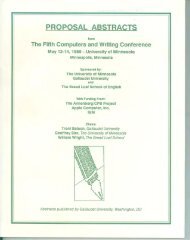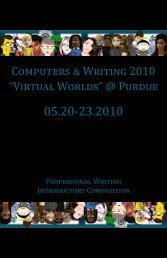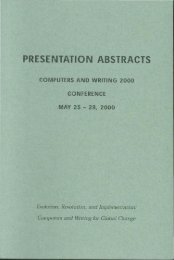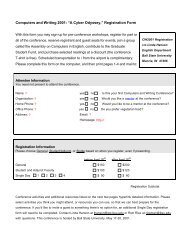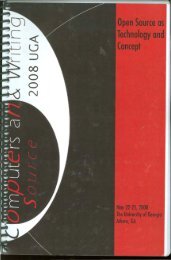CW2001 Program - Computers and Writing
CW2001 Program - Computers and Writing
CW2001 Program - Computers and Writing
Create successful ePaper yourself
Turn your PDF publications into a flip-book with our unique Google optimized e-Paper software.
3:45 — 5:00 Session D.1<br />
Distance Over Time:<br />
A Historical Odyssey of Rhetoric <strong>and</strong> Distance Education<br />
RB 107<br />
Claudine Keenan, moderator<br />
Kevin Eric DePew<br />
Disrupted Discourse:<br />
The Evolution of Our Rhetorical Expectations in Distance Education<br />
The speaker focuses on the written discourse that is often necessary to<br />
communicate in a computer-mediated distance education context.<br />
Communication through word processing files, Web pages, synchronous<br />
communication <strong>and</strong> asynchronous communication has been problematic<br />
because each interlocutor–the administrator, the designer, the instructor,<br />
the student–has disparate expectations of how writing shapes the<br />
experience of the “classroom without walls.”<br />
Julia Romberger<br />
<strong>Writing</strong> Instruction in Distance Education:<br />
Stuck in the Mailbox<br />
This speaker follows in the tracks of many early compositionists <strong>and</strong><br />
applies the concepts of audience <strong>and</strong> social-construction from classical<br />
rhetorical theory to a contemporary pedagogical concern, which in the<br />
case of distance education is the use of synchronous <strong>and</strong> asynchronous<br />
technologies for communicating. These technologies can not only<br />
enhance the experience, but building communities within them can<br />
enhance the students sense of a context for their writing.<br />
Bridget Ruetenik<br />
Distance Education in the History of Rhetoric:<br />
An Exploration of Values<br />
In many ways, composition studies has evolved out of product-based<br />
pedagogy. But distance education especially calls our attention to particular<br />
values regarding literacy that were perhaps overlooked, or not so relevant,<br />
in the paradigm shift so famously articulated by Maxine Hairston. This presenter<br />
will trace the evolution of existing values about literacy to nineteenth-century<br />
rhetorical practices <strong>and</strong> suggest ways to investigate their effects on our<br />
teaching practices in distanced writing environments.<br />
<strong>Computers</strong> & <strong>Writing</strong> 2001<br />
51



